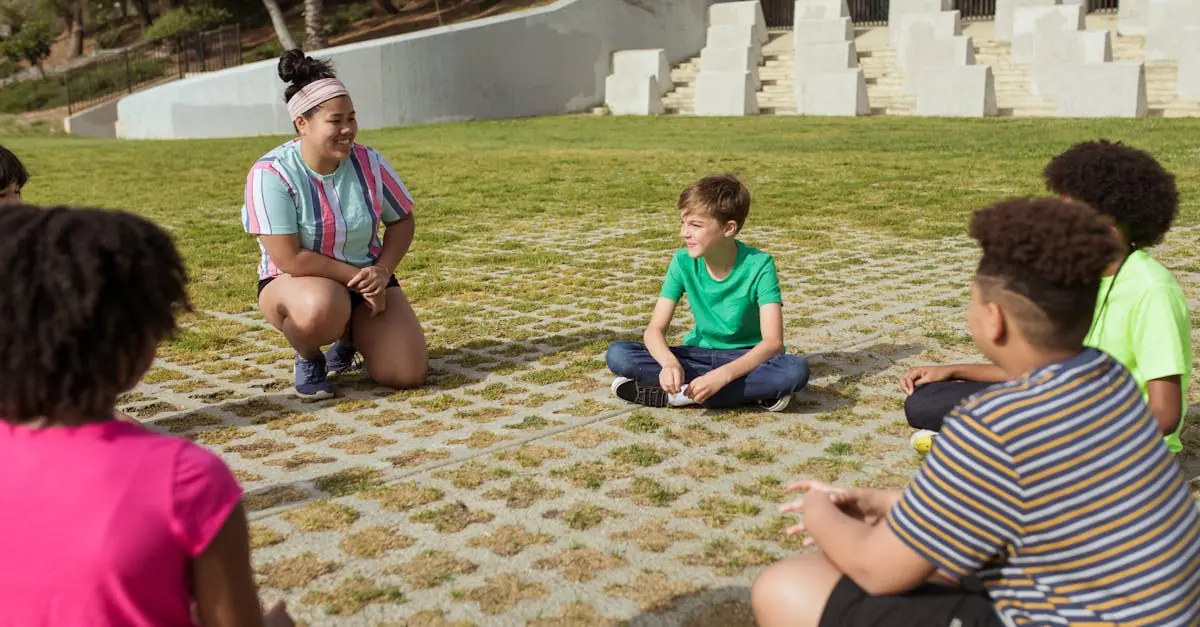As summer approaches, the demand for skilled camp counselors skyrockets, but what if the training could happen right from the comfort of home? Enter virtual camp counselor training—a game changer for aspiring counselors. Picture this: no more awkward icebreakers in stuffy rooms, just you and your trusty laptop, ready to unlock the secrets of camp magic from your favorite cozy spot.
Table of Contents
ToggleOverview of Virtual Camp Counselor Training
Virtual camp counselor training meets the demand for skilled camp staff during the summer season. This model caters to aspiring counselors seeking essential skills without the constraints of in-person sessions. Participants engage in interactive online modules, fostering a comprehensive understanding of child development and group dynamics.
Training courses cover various topics such as safety protocols, activity planning, and effective communication techniques. Each section emphasizes real-world applications, equipping counselors to handle situations they may encounter while working with campers. Many programs include scenario-based learning, offering practice through virtual scenarios.
Convenience remains a key benefit of this approach. Trainees can access materials on their own schedules, which enhances flexibility. Online discussions with peers and instructors encourage collaboration, leading to a supportive learning environment. Camp organizations see increased engagement as a result of these collaborative efforts.
Technology also plays a significant role. Various platforms facilitate video conferencing and forum discussions, allowing trainees to connect easily. Engaging multimedia content such as videos, quizzes, and games enhances the learning experience. These elements ensure the training remains interactive and enjoyable.
Consequently, virtual camp counselor training provides a streamlined and effective pathway for motivated individuals. This innovative approach prepares them to create memorable experiences for campers. Aspiring counselors gain confidence through comprehensive training, which ultimately enriches the camp community.
Benefits of Virtual Camp Counselor Training
Virtual camp counselor training offers numerous advantages that enhance the learning experience for aspiring counselors.
Flexibility and Accessibility
Flexibility stands out as a primary benefit of virtual training. Trainees enjoy the freedom to access materials on their own terms, making it easier to balance other commitments. This approach eliminates geographical barriers, allowing individuals from various locations to participate seamlessly. Accessibility matters; online platforms serve learners with different needs and schedules. Participants can revisit lectures and discussions at any time, reinforcing their understanding of essential topics. Such convenience promotes a more relaxed learning environment, encouraging deeper engagement with the course content.
Enhanced Skill Development
Skill development receives a significant boost through interactive online modules. Engaging content focuses on crucial areas such as safety protocols, activity planning, and communication techniques. Scenario-based learning ensures counselors are well-prepared for real-world situations they might encounter. Groups often participate in collaborative discussions, fostering peer learning and feedback. Various multimedia tools heighten the training experience and cater to different learning styles. This comprehensive approach builds confidence, ensuring trainees are equipped with the knowledge needed for impactful camp experiences.
Key Components of the Training Program
The training program for virtual camp counselors focuses on essential skills and knowledge to equip trainees for their roles. Core components include a well-structured curriculum, interactive methods, and effective tools.
Curriculum Structure
A comprehensive curriculum presents essential topics, ensuring counselors are prepared for various situations. It includes modules on safety protocols, activity planning, and communication techniques. Each module builds on the last to create a cohesive learning experience. Assessments and interactive assignments reinforce knowledge and encourage critical thinking. Trainees access materials at their convenience, supporting a personalized learning pace.
Interactive Methods and Tools
Engagement remains a priority through interactive methods and tools throughout the training. Live video sessions provide real-time interactions with instructors, fostering a deeper understanding of course material. Group discussions and collaborative projects enhance peer learning, allowing trainees to share insights and experiences. Multimedia presentations, including videos and quizzes, cater to diverse learning styles. These methods not only boost engagement but also ensure that counselors feel confident applying their skills in real-life camp environments.
Challenges in Virtual Camp Counselor Training
Virtual camp counselor training presents unique challenges that can impact the effectiveness of the learning experience. Key issues include maintaining participant engagement and addressing technical difficulties.
Engagement and Motivation
Keeping trainees engaged in a virtual environment can prove challenging. Interactive components help foster motivation, but not all modules succeed in capturing attention. It’s essential to incorporate varied formats, such as videos and discussions, to stimulate interest. Some trainees might struggle with focus when learning from home, leading to decreased participation. Building a sense of community through group activities can enhance motivation. Remaining attentive to engagement strategies, such as gamification or live Q&A sessions, reinforces commitment throughout the training process.
Technical Difficulties
Technical issues can disrupt training sessions and hinder progress. Connectivity problems may lead to interruptions during live classes, leaving trainees frustrated. It’s crucial to provide clear instructions for troubleshooting common issues before sessions begin. Some trainees may lack access to necessary technology, affecting their ability to participate fully. Offering alternative modes of communication, like recorded sessions, can ensure everyone receives the required information. Addressing these challenges helps create a smoother experience, allowing for better focus on developing essential counselor skills.
Conclusion
Virtual camp counselor training represents a transformative approach to preparing aspiring counselors for their roles. By leveraging technology and flexible learning options, this innovative training method meets the growing demand for skilled staff while making the process more accessible.
Counselors gain essential skills through interactive modules that emphasize real-world applications. This not only builds confidence but also fosters a sense of community among trainees. While challenges like maintaining engagement and managing technical difficulties exist, strategies can enhance the overall experience.
Ultimately, virtual training equips individuals with the knowledge and tools necessary to create unforgettable camp experiences. As the camp landscape evolves, embracing this modern training method will be crucial for future success.




